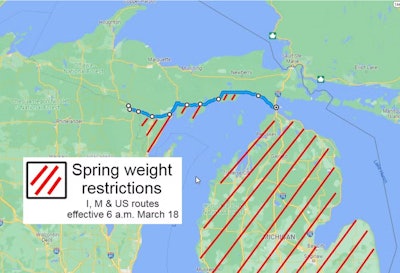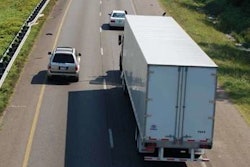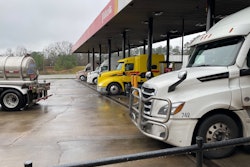Trucking news and briefs for Monday, March 21, 2022:
Texas court reinstates Trump-era DOL independent contractor rule
A Trump-era Department of Labor rule that would have further clarified the definition of “independent contractor” under the Fair Labor Standards Act, which was halted when the Biden administration took office and later officially withdrawn by the DOL, has been reinstated by a Texas court.
In a ruling issued March 14, Judge Marcia A. Crone in the Eastern District of Texas said the DOL’s withdrawal of the rule violated the Administrative Procedure Act (APA), which governs how federal agencies develop and issue regulations.
The lawsuit, brought by the Coalition for Workforce Innovation, Associated Builders and Contractors of Southeast Texas, Associated Builders and Contractors, Inc., and Financial Services Institute, Inc., alleged that DOL did not provide notice and comment periods as required by the APA.
“By refusing to consider alternatives to the total withdrawal of the Independent Contractor Rule, the DOL failed to ‘consider important aspects of the problem before it’ — the lack of clarity of the economic realities test and the need for regulatory certainty,” Crone said in her ruling.
The DOL published the rule on Jan. 7, 2021 and was set to take effect March 8, 2021. The Biden administration halted the rule with a regulatory freeze in January, and later fully withdrew the rule in May. The rule uses five economic-reality factors to help businesses determine whether a worker is an employee or an independent contractor. Two of those factors – the nature and degree of the worker’s control over the work and the worker’s opportunity for profit or loss – are the two primary factors for determining a worker’s classification and carry greater weight than the other three factors.

The other factors include: the amount of skill required for the work; the degree of permanence of the working relationship between the worker and the potential employer; and whether the work is part of an integrated unit of production.
With the rule now reinstated, it is officially effective, as of the rule’s original March 8, 2021, effective date. It’s unclear whether DOL will challenge the ruling or issue a new rule to reverse the Trump-era rule. The court ruling comes as the Supreme Court considers challenges to California's ABC test for independent contractor determination, problematic for leased owner-operator businesses in traditional lease arrangements.
[Related: Details on the DOL's originally proposed independent contractor defining rule]
As 3G networks sunset, FMCSA issues two ELD extensions
The Federal Motor Carrier Safety Administration earlier this month issued extensions for two electronic logging devices still utilizing 3G cellular networks that are in the process of being shut down to make room for faster networks.
FMCSA has granted an extension for any carriers using the ELDs below, allowing the carrier's drivers to continue to use paper records of duty status in lieu of the ELD until the 3G dependent devices are replaced with a compliant 4G or 5G device.
The devices covered under this extension are:
- Omnitracs Intelligent Vehicle Gateway; ELD Identifier: IVG001; Serial Numbers (SN) 108000000-108499999
- Blue Tree ELD; ELD Identifier: BT500
A carrier must maintain the document granting this extension at the carrier's principal place of business and keep a copy in each vehicle with a malfunctioning ELD. A driver must make the copy of this document available to a safety official upon request.
Operators using the Omnitracs device were given until March 31 to upgrade to a 4G or 5G device, while operators using the Blue Tree (Orbcomm) device have until April 29 to replace theirs.
FMCSA notes that Blue Tree ELDs with the ELD Identifier BT504 are not covered under the extension.
AT&T was the first cell carrier to shut down its 3G networks on Feb. 22. T-Mobile, which is responsible for Sprint’s 3G network, will shut down the Sprint 3G network on March 31. Other network shutdowns coming this year include:
- Sprint LTE (T-Mobile): June 30
- T-Mobile 3G: July 1
- Verizon 3G: December 31
[Related: ELD compliance in jeopardy for many with 3G networks' sunset]
Stevens Transport boosting pay across divisions, including contractors
Last week Friday, March 18, Stevens Transport announced it will give its drivers driving what the company said is "the largest and most comprehensive pay increase in the company's 42-year history."
According to a statement from the company, driver pay in its over the road, regional, intermodal, contractor, and dedicated divisions will rise by nearly 15%. That means first-year company drivers will earn up to $70,000, experienced drivers in the OTR, dedicated and regional divisions can earn $90,000 or more depending on the region, experience, and the customer they are delivering for. Team drivers in the expedited division will be earning more than $175,000 annually. Independent contractors can gross $250,000 or more annually, according to Stevens.
"Our Drivers have been performing at an outstanding level for our customers," said Clay Aaron, Stevens' president. "We are proud to announce our third driver pay increase in the last 16 months, with this being our largest pay increase in our history."
Michigan expands weight restrictions into Upper Peninsula
 Michigan's spring weight restrictions now extend into the Upper Peninsula.
Michigan's spring weight restrictions now extend into the Upper Peninsula.
Effective 6 a.m. Friday, March 18, weight restrictions will be imposed and enforced on all state trunkline highways from the Michigan/Indiana and Michigan/Ohio state lines north to and including US-2/US-141 at the Menominee River bridge west of Iron Mountain, then east on US-2 to St. Ignace. State routes typically carry M, I, or US designations.
MDOT determines when weight restrictions begin each spring by measuring frost depths along state highways, observing road conditions, and monitoring weather forecasts. Weight restrictions remain in effect until the frost line is deep enough to allow moisture to escape and the roadbeds regain stability.
Earlier this month, MDOT issued weight restrictions throughout the state up to the Mackinac Bridge.









